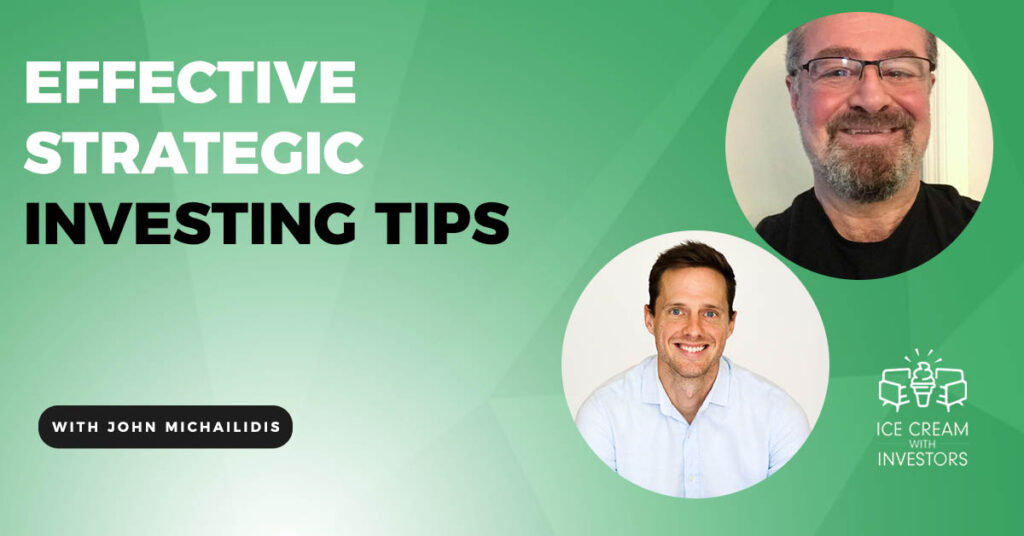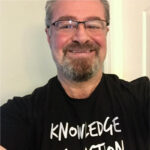If you want to spend more to gain a more comfortable lifestyle, you need to secure a smooth cashflow through consistent income streams. John Michailidis shares his most effective strategic investing tips on securing profitable real estate success. He joins Matt Fore to share his experiences running a property management company and the right way to scale such a venture. He also discusses why derivatives are vastly different from hard assets and the importance of hiring a planner to handle the confidential and constantly changing aspects of estate planning.
Are you interested in investing with me? Click this link schedule time for us to connect. https://nextlevelincome.com/next-level-investor-club-application/
Strategic Planning and Investing for Individuals: Asset Protection, Diversification, and Passive Investing for Cash-flow and Lifestyle Liberation – https://www.amazon.com/Strategic-Planning-Investing-Individuals-Diversification/dp/0978819004
Atlas Shrugged – https://www.amazon.com/Atlas-Shrugged-Ayn-Rand/dp/0451191145
John’s Website:
John’s LinkedIn:
https://www.linkedin.com/in/johnmichailidis/
John’s Facebook:
https://www.facebook.com/johnnymich
Twitter:
https://twitter.com/JohnnyMich
This expert guest was booked via The Expert Bookers: www.expertbookers.com
—
Watch the episode here
Listen to the podcast here
Effective Strategic Investing Tips With John Michailidis
John, welcome to the show.
Thank you very much. It’s my pleasure to be here.
We like to start with the difficult questions here. What’s your favorite ice cream?
Through law school, I never pondered a question. I’ve been thinking about this for days because there are many nuances. I have a few answers for you. If I want something more subtle, more elegant, I like a nice pistachio ice cream. Normally, I’ll go something with fudge and goo, a Turtle, Moose Tracks, something like that. It depends on the mood. The most interesting ice cream I ever had was when I was traveling through the State of California, the Inland Empire. There was a lot of agriculture.
I happened to be in an area where they produced a lot of garlic. We pulled over at this truck stop. I saw this case of cups of garlic ice cream. I laughed out loud to myself and spoke out loud, “Garlic ice cream?” The guy’s standing there and said, “Do you like garlic?” I said, “Yeah, I like garlic, but come on.” He said, “You buy one. If you don’t like it, I’ll give you your money back.” How could I not take them up on that? It was one of the best ice creams I ever had in my life, garlic ice cream.
That is the most unique answer we’ve had so far. My mother always says that every good meal starts with garlic. It sounds like every good meal can end with garlic ice cream.
You have to like the flavor of garlic, but if you do, it was yummy.
Tell our readers, what’s the scoop? What do you do now?
I own a residential property management company in Sarasota, Florida. I’ve been in the real estate business for many years primarily, in brokerage most of that time. Since 2012, I’ve had this residential property management company, which I’m phasing out of. By the end of 2023, I plan to be out of that, and we’ll figure out what I’ll do with the rest of my career.
Are you selling the business or how are you phasing out there?
I’ve been selling off the properties on behalf of my owners. I’m a broker also because I could get a lot more in commissions. I thought about this. The return on selling the properties and getting the commissions are much higher than I could get selling the doors.
That’s a super interesting exit strategy. You’re not going to sell the business. You’re going to sell the assets inside the business that you technically don’t own.
I own a franchise. There is some reasoning there why I thought that might be a better way for me to go. I’ll probably sell the remaining small core, but we’ll have reaped the greatest return from the few dozens of sales that I’ve had over the last few years out of my landlord pool.
You’ve got a pretty diverse background that we’re going to get into. How did you get involved in the property management business? You’re down there in Sarasota. You’ve spent some time in Buffalo, Austin, and Chicago. How did you end up in Sarasota managing properties?
That’s a very good question, and there’s a lesson to be learned. I graduated from law school at Northwestern in Chicago. I had been in the real estate business prior to law school. I didn’t go to law school because I wanted a job as a lawyer. I wanted to learn the law, went back into the real estate business, and started a brokerage called Chicago Building Exchange.
I analyzed the market thoroughly and everybody is running around selling condos. That’s what you got in a big city, not houses. Everyone’s selling condos. I could have been another condo guy. The big guys are selling the skyscrapers. What’s that sweet spot in the middle? I saw that there was no one concentrating on smaller buildings. We call them flats in Chicago, 4, 6, or 10 flats.
You’ll have a building with 3 storefronts on the bottom and 15 apartments upstairs. There was no one that dominated that market. I called myself Chicago Building Exchange, why list your small building with a condo guy when you could do it with the small building experts, Chicago Building Exchange? That’s what I was doing up until the crash in ‘08.
The crash of ‘08 comes, business goes away. At that time, I was highly leveraged in my own investments. I lost everything, foreclosures. I got pummeled. I had $1,000 in my pocket, and I moved to Sarasota because I had family in Sarasota. I went broke after making a few hundred thousand dollars a year for a while. I moved in with my mom. I’m in my 40s and living in her third bedroom. I get to work flipping short sales.
What else is there to do? I start flipping short sales in Sarasota. One year I spent in that third bedroom with my mom as a 40-year-old man, how ego-busting that was. I clawed myself back and made about $140,000 that year, got my own place, had some money in my pocket, and thought, “What are you going to do? This short-sale business, foreclosure business isn’t going to last forever.”
It was starting to wane a bit. Already, I could see the writing on the wall. The way I was doing it was with simultaneous closings. I was purchasing properties, closing on them five minutes later, selling them off to someone else, and keeping the spread. In addition to negotiating short sales on the regular brokerage, short sale stuff for third parties. That is what I was doing.
When the foreclosure business started to wane a bit, some investors saw the writing on the wall. They purchased properties and closed them rapidly by negotiating short sales.CLICK TO TWEET
I said, “This isn’t going to last forever. Plus, I had developed a vehement hatred of the banksters.” To me, the banking and lending industry, as far as the real estate business goes was another co-professional, but I realized there are some evil, greedy, dark, nefarious things going on in that business, at least at that time that put a horrible taste in my mouth. I had to get out of it.
What do you do? You think and observe what’s going on. We’ve got all these houses down here in Florida. They were everywhere. The grass is 2 feet high and abandoned houses everywhere, boards, and people stealing the AC units. It was everywhere down here. I said, “These houses aren’t going to get bulldozed and nobody’s going to be able to be buying them in for a while.” I’m talking about the people that have been moved out due to foreclosure.
They’re not all going to go live under the bridges. Rentals are going to be the thing for the next few years. Although through Chicago Building Exchange, I had worked with tenants because I was selling multi-unit properties, due diligence and hadn’t looked at rent roads and all of that stuff, I still wasn’t a property manager.
I said, “I probably need to partner with someone.” I bought a real property management franchise, and figured I have a backstop as I get going in this. That’s how I got into the property management business. I thought it was going to be a good business for the next few years, and I was right. It was a business of opportunity given the times. I don’t need to be in the property management business anymore. It wasn’t my heart’s passion. It was something I thought would be good to do. Like I said, this 2023, I plan on phasing out of it completely.
What was that experience like? One of my property managers here in Nashville is a real property management franchisee as well. He, by far, is the best property manager I have ever run across in my life. For anybody investing in the Nashville area, I’ll make sure to pass along his contact information because he’s good. Talk us through that process because I don’t think I’ve talked to anybody about what does that process look like?
What process?
Buying the franchise.
That’s pretty simple. You read the contract and decide if it’s onerous to you or not. They get a cut out of your monthly revenue stream. They have a right to look at your book so they can see what the actual numbers are, then you have support. Let’s back up. Knowing what I know now, I would not need a franchise. I could go start a property management company, a white label on my own, but I didn’t know that then. The benefit to me was the marketing. I’ve let them know that we have a new property and it gets put into the system. It gets blasted out everywhere, and then the negotiation of special deals on various things. Our AppFolio software is cheaper for us than it is for anyone else.
There are a lot of backend tools, lock boxes, insurance, and all of that stuff. If I were on my own paying the normal price of an off-the-street property manager, it would be more expensive. I get discounts because of the bulk buying power of being associated with them. If I need to make a phone call and find out about something, I can. They’d run the websites, keep that going, and all of that good stuff.
As far as speaking with owners about it, “What’s the benefit to you, property owner? What do you care if I’m a franchise or not?” I said, “The only things that matter to you that would be important to me if I were in your situation evaluating property management companies, is that there’s a Fortune 500 company that sits back here, looks at those books every month, and makes sure the bank accounts are reconciled.” I’m not saying your property manager who isn’t affiliated with a national franchise is going to be doing anything nefarious. It should be comforting to an owner to know that there is someone looking over the shoulders and making sure everything is straight. That marketing reach and heft that we have through the deals that real property management has is important from the property owner’s standpoint.

Strategic Investing: A property manager offers a comforting feeling to owners. They have someone looking over their shoulders and making sure everything is straight.
The last question I’ll ask you about property management business is I have had a couple of conversations with property managers on the show, but I don’t think I’ve ever asked the question, “What was the hardest part about running and scaling a property management company?”
Finding vendors that would show up how to do good work, which is plain and simple. My solution was serendipitous. I was in it six months and I’m like, “I can’t find a good plumber, handyman, and electrician. People don’t show up. They do shoddy work. All property manager is bookkeepers and middlemen.” We’re subcontracting out all the work. We’re the liaison.
We’re making sure everything gets done, putting the work with the vendor, and then paying the bills, making the statements, and collecting the rent. It’s what we are. We’re liaisons. We’re orchestra conductors. If you don’t have good members of the orchestra, you’re screwed. You’ve got to have a team. Property management is a team sports.
I was sitting in a Starbucks and somebody mentioned BNI. It’s an organization called Business Networking International. They’re global. It’s a membership, so you pay your dues. The model is you’ve got professionals, one allowed from any given field. There could be ten chapters in a community, depending on how big the community is. In a typical BNI organization chapter, you’ll have 1 residential property manager, 1 residential real estate salesperson, 1 commercial salesperson, 1 insurance guy, 1 real estate attorney, and 1 litigation attorney.You have 1 plumber and 1 electrician.
I got into a BNI group because you have a weekly meeting. You go have breakfast. Every week, I sat down with my electrician. The idea is everybody is getting leads for everyone else. When you’re in that BNI group, your job is to find leads for your plumber, electrician, flower shop lady, and your coffee shop guy. They’re doing that for you.
I could care less about the leads that I would get for people wanting to rent out their property. My goal was to find a plumber, an electrician, and a handyman that would show up. I found that was an excellent means of securing. I have been a member of BNI for six years or maybe more. My plumber and lawn guys, all of those people came from BNI because there’s accountability there. That was a very long answer to the most difficult part of getting going in a property management company.
If you’re out there reading, you own property that you’re managing yourself, and you’re thinking, “Why do I pay a property manager?” It’s for exactly that. You bought a whole Rolodex of contact information and people that will show up to do the work. In the past couple of years, that’s been difficult to show up to do good work and know the history of hiring contractors. I appreciate that insight there.
I want to shift this now into your book. You wrote a book, Strategic Planning And Investing For Individuals. I was thumbing through it, doing some research, and it’s the book I wish I would’ve written because it talks through a number of different things, tax strategies, estate planning, investment vehicles, and things like that.
I want to take this conversation into two parts. First, let’s talk about the investment summary. You’ve been involved in real estate and investing for a very long time, but you also offer some different opportunities for people to invest and investment vehicles as well in the book. Talk us through what is an investment in John’s eyes.
To me, an investment is an economic machine. If it doesn’t spit out cashflow, it’s not an investment. This isn’t textbook. This is my definition. Putting money into whatever, hope, and getting no return in the hope that ten years from now, it will be worth more. To me, that’s not an investment. A business that you put a capital investment, you work it either yourself or have other people working it for you, doesn’t matter. You put in that capital. Two things have to happen. It doesn’t get wasted and doesn’t strike. It’s the security of capital. That capital is working the spit off cashflow. Cashflow comes out of this little economic machine.
An investment is an economic machine. If it doesn’t spit out cashflow, it’s not an investment.CLICK TO TWEET
What do you do with this cashflow that comes out the other side? You could put it back into this machine. This machine can create even more cashflow that you could put back into this machine and keep going that way or you can take it, create another machine, and get that one going? You can take it and put it into another machine so you could have 1, 2, or 5 big machines or 15 little machines.
I tell people, “Why don’t you try this? Instead of going for huge investments, try taking out your car payment. Find an investment that’s going to take out your car payment. You’re not going to get rich off this investment, but your car is going to be paid for the rest of your life. Go find another investment that’s going to take out your family’s cell phone bills and house payment.” If you keep taking out payments like that, one day, you’re going to find, “I don’t have to work.” All my necessities are taken care of, not through hitting home runs. Everyone wants a home run. Singles, doubles, and triples are nice too, but singles, doubles, small little cash machines spit out income.
I’m happy to hear you say an investment is something that spits off cashflow. I am a personal belief that if you’re investing in something, it should automatically produce cashflow. If it doesn’t, you’re speculating. If you’re speculating, you might as well go to Vegas and at least get some free drinks from it or from Bitcoin. The second thing I’m glad you said was this idea of you don’t have to go hit home runs. I talked to some friends that I’m trying to get them involved in investing. It showed them the light.
One of the investments I showed them is like, “You’re going to receive $200 a month of cashflow off of this.” They’re like, “That doesn’t make me excited because my bills are X. My income is Y.” I’m like, “Yes, but that is your car or gas payment, or cell phone bill. All of a sudden, when you start knocking down bills with your investments, you live an abundant and free life.” I’m happy that you mentioned the singles versus home runs.
Since we are on the same wavelength there, let me read the subtitle of the book. The title is Strategic Planning And Investing For Individuals. The subtitle is Asset Protection, Diversification and Passive Investing For Cash-Flow and Lifestyle Liberation. That’s what it’s all about. Let’s talk about something else with respect to that. I don’t get to determine what your lifestyle should be or needs to be. The point being you don’t have to become a multimillionaire man.
If you would be happy living on $70,000 a year, you can design a life where you have income streams coming in $70,000 a year and you’re free. You’re done. You don’t have to strive to become a multimillionaire. You can set up a $70,000-a-year liberation. That’s your lifestyle or a $700,000-a-year liberation if that’s your lifestyle. You choose.
The point is don’t let anybody else talk you into what it should be. It doesn’t have to be all that hard. Setting up a $70,000-a-year lifestyle liberation is less involved than setting up a $700,000, $7 million, or $70 million. The point is to get off of this idea of what success is and isn’t. You decide what success is or isn’t. I promise you it can be much easier than you think. Who is talking like this? The HR lady who’s telling you to put all your money into the 401(k)?
It comes to the conversation of different asset type vehicles. Both of us are real estate people. We can all assume that we prefer real estate or we have a bias toward real estate. I’ve heard you talk about this idea of hard assets versus derivatives, and maybe you could level-set what is a derivative and then how that differs from a hard asset.
If you think of the word derivative, it derives its value from something else. It does not have any value. If I own a bushel of corn, the value is in the corn itself. I can eat that corn, sell that corn, or plant that corn. The value is in the bushel of corn. I could also buy a futurist contract for corn. Do I own any corn? No. I don’t own any corn. What I have is a bet on the future price going either up or down and do with options too. It’s a bet on a future value. It has nothing to do with corn per se. That’s the marker that we’re counting up against.
Let’s talk about gold. You can hold it in your hand. It’s a commodity. It’s a real thing and a physical asset. You could go buy a gold index fund. You don’t own any gold. It’s derivative. You’re making money, yes or no, depending on the price of gold, but call them up and say, “Send me my gold.” They’ll say, “What are you talking about? This is an index fund. There is no gold here.” The difference between a commodity and a derivative is something that has intrinsic value in and of itself, and something that derives its value from something else.
Many people think they’re investors, but they are speculators. The investor is investing assets. If you’re investing in derivatives and speculations, you’re making bets on the future price. There’s no real value there. There’s a lot of smoke and mirrors going on. How about bank accounts? Just so you know, you don’t own the money in your bank account. That money belongs to the bank. It’s an asset on their books. It’s not a liability on their books, which is what it would be if you own that money. All you do is you have a claim against the bank’s general asset pool, that may or may not be paid back and probably it will be. The point is many people think things are assets they are not.
If you’re investing in derivatives and speculations, you’re making bets on the future price. There’s no real value there.CLICK TO TWEET
I’m glad you went into this idea of derivatives and what you own because one of the things that I was going through in this process of developing a framework to help people understand an investment. One of those is what is your ownership stake in it? You might own a share of Apple. You do technically own a piece of that company, but it’s such a small piece that do you even have a meaningful say in it? Versus if I go and buy a single-family home, “I own that property.” This idea of what your level of ownership is and where you sit in the preference stack of that ownership matters in terms of your financial, returns on that investment.
A share of stock is very similar to a bank account. This is the analogy I used. You own an undivided claim against Apple Corporation, but you don’t own anything in Apple Corporation. It’s just a claim that you have against the company. This is much different nowadays in reality than when the idea of a stock corporation came about hundreds of years ago. Think of the difference between someone who buys into a syndication as a limited partner. They’re a partner.
You’re not a partner with Apple. Apple doesn’t care about you. Pick up the phone and say, “I want to talk to Mr. Apple.” “Get out of here.” You’re a limited partner in syndication. Sure, you’re limited means you’re not operational. You sit back and let the pros do their thing, but you’re their partner. They will talk to you. You’ll have someone to call. There’s accountability there. What happens if Apple goes bust? “Oopsy.” That’s what happens.
There are a lot of people that are going to sit in front of me in that capital stack. Another part of your book is estate planning. Since you are a non-practicing attorney, I’m assuming non-practicing there, but since you do have a JD behind your name, I do want to talk through estate planning because it is something that is very critical along the journey of financial independence.
I’m starting to understand the importance of specifically if I pass tomorrow, the names on a bank account are the people that get access to that money regardless of the will that supersedes and some of these small intricacies like that. What is it about estate planning that most individuals don’t know and you think should know?
It’s probably, first of all, “Why is it an investing book?” Investing to me is about designing your finances around your lifestyle. It’s an integration of many different things. Estate planning is simple, “What happens to my stuff when I pass or become incapacitated? Who controls my stuff when I pass or become incapacitated?” What about this, “Who takes care of my kids when I pass or become incapacitated?”
We talk about investing because we want to secure life. We’re not investing because we want to accumulate pieces of paper with green ink. Estate planning is about securing the stuff that you’ve built and making sure it goes to the parties that you want it to go to. It doesn’t go to the parties that you don’t want it to go to. If there are parties that you want it to go to, but maybe they’re not ready for it, it’s structured in such a way that it is doled out or there are approvals needed to protect them from themselves. Do you want a judge deciding all this stuff?
Probably not.
It’s simple, “What happens to my stuff when I die or become incapacitated? Speaking of incapacitation, what happens to me? Who takes care of me? Does the judge decide where I go and how I get taken care of? Do I decide that upfront in consultation with my family?” Assuming you’re not a single person, a lone wolf in the world, this is something that’s done in conjunction with the entire family. It’s something that’s discussed. It’s not a morbid thing about death. It’s about securing our family so it doesn’t fall apart, and it isn’t left to the whims of a judge that we get to decide.
Do you have a couple of questions that somebody that’s new to this process can start asking themselves so they can work through and have an intelligent conversation with an estate planner?
Not particularly, and here’s why. You find yourself an estate planning attorney. You’re going to see an ad of $500 estate plan. Don’t hire that person, please. Realistically, this is what a good real attorney do is estate planning, not a general estate, “Sure, I’ll put together an estate plan for $700.” No, $3,500 to $5,000 is probably what a good estate plan is going to cost you.
The first thing is 100 questions they’re going to ask you. They’re going to ask you all about what your assets are, your health, and your family members. You don’t know what to ask them. They know what they need to know to ask you. Based on the answers that they receive, they’ll be able to structure your estate plan accordingly.
“I’ve got 2 daughters and 3 sons,” and then they’ll start asking you, “Tell me about this daughter. What do you want them to get? Are there any issues?” I know people whose sons had a drug problem. They wanted them to be taken care of but they didn’t want to enable them. Each question leads down its own trail. A competent estate planning attorney isn’t going to give you some boiler-plain piece of paperwork. They’re going to ask you all the appropriate questions to come up with a document that suits you and your situation.
Remember, estate plans change. They should be reviewed every five years or so in general. New relationships are formed. Old relationships die away. New assets come into the picture. Old assets go out of the picture. New healthcare situations come in. These things need to be reviewed. They’re living documents. They are certainly no boilerplate documents, which is why you should only go to an estate planning attorney. That is what they do in estate planning. Finally, estate planning is state law. You need to go to an estate planning attorney. If you’re in Wisconsin, find the best estate planning attorney in Wisconsin because Wisconsin laws are not Florida or Illinois laws.

Strategic Investing: Estate plans change and must be reviewed every five years or so. Old relationships die away and new assets come in. This is why you need to hire an estate planning attorney.
That’s a good piece of advice there. It seems obvious after you said it, but I didn’t know that they were state runs. This is a fantastic conversation, but I want to switch us now into our last round. We’re calling this the Five Toppings. Our first one is, What is your favorite book or what is a book that you’ve read recently that’s given you a paradigm shift?
I read about 30 books a year. Favorite book is the hardest question. I have to say the Christian Bible and the Jewish Torah are two prime books for me. That’s not what we’re talking about here. Formative books would be Ayn Rand’s Atlas Shrugged and Ludwig von Mises’ Human Action formed my economic thinking. Atlas Shrugged formed my social worldview thinking as a young man. Those two books, but John F. Kennedy Jr’s book on the COVID epidemic was eye-opening.
I’m surprised that up until this point, we’d never had someone say Atlas Shrugged.
That’s killer work right there. I pick winners.
Our second one is, I believe that the person you become ten years from now is directly correlated to the habits that you have and the things you do every day. What are some of the habits that you have?
The first thing I do every day is my quiet time. I’ll do some reading, praying, thinking, and planning. My back porch overlook is a state park. In the mornings, I’m out with my coffee, my Bible and whatever books I’m reading on a pad and I’m watching the bald eagle fly by. That’s how I start my day. Generally, I’ll do some stretching after that. I’m old. I have arthritis. I’ll get my bones moving a little bit, and then I start my day. That’s how I start every day. I don’t have it on right now but I have a Fitbit. My wife and I are making sure we get our 10,000 steps a day. I love it. We’ve only had it for a couple of months.
Our third one is, what is the best piece of advice you’ve ever received?
Think for yourself because there is so much nonsense. If you’re getting your news from the TV, MSNBC, and Fox News, they’re opposite agendas, but they’re all agendas. They’re all people trying to guide you into actions that will serve them best. Design your own life. The only way you can do that is to think for yourself. This is going to sound very harsh, but if it’s coming out of a politician’s mouth, I automatically don’t believe it, no matter who it is. I don’t care who it is. Think for yourself.
If they’re saying that, “Inflation is transitory.” I didn’t buy that for a second, but you know how many gurus started saying, “It’s transitory?” If you pay attention to what’s going on, looking at Fed data, listening to Eurodollar University, not listening to Daniela Cambone videos, and not seeking out your own truths, then you’re going to find that your life is controlled by the whims of power structures that don’t give a rats patootie about you and your family.
I heard Tim Ferriss say on a podcast in 2015 that he stopped watching cable news, and it’s probably the best thing I’ve ever implemented since then.
Thinking for yourself means hanging out with people that have something to say. If you’re following Matt, you’re already doing this, but find 10, 15, or 20 Matts, people that you know that they know what they’re doing, that they’re trustworthy, honest people, and follow them. You will find that they will tell you whom they’re listening to, and then you’ll listen to them. They’ll tell you what conference they went to and then you might go to that conference. When you go to that conference, you might meet somebody sitting next to you. You will find that there’s a world of knowledge that you’re not going to get on MSNBC and Fox News.
We like to watch blood sports. Our blood sports and our gladiators of the time are commentators yelling at each other.
“I don’t care who got $50 million from the enemy, but that’s okay. You’re making it up.”
Our fourth one is, what are you most proud of in your life?
I’m proud that I grew up as an upstanding citizen. I’m not a perfect man. My parents divorced when I was two. I was the kid with the key chain in New York City on the subway at six years old. Literally, I could have become a different person. The fact that I kept it on the straight and narrow, sought my education, and worked very hard. I’m proud that I’m not a perfect human being, but a decent human being.
It’s hard sometimes. Making the right decision, even though it’s a hard decision is probably one of the hardest things to do in life.
You’ve got to get it because the world wants to teach you that the almighty dollar is the highest attainment. If you get the bucks, that’s what success is. Look at all the Goldman Sachs traders that got caught for fixing the gold market, and think about what was happening in ‘08 and the liar loans. There’s much filth, greed, lies, and deceit in the business world. Keeping it on the straight and narrow and saying, “I don’t need that money right there. It’s not worth my soul.”

Strategic Investing: There is so much filth, greed, lies, and deceit in the business world. Keep everything straight and stay away from money that is not worth your soul.
Our last one is if you could sit down and eat a bowl of ice cream with anyone, dead or alive, who would it be and why?
For me, it would be Jesus Christ, and that would be why. No need for an explanation there, but if we’re going to take it out of that realm, it would be Elon Musk. The guy fascinates me. Think about this guy. Rocket ships that land like the old sci-fi movies and pencil landing on its tip, “We’re going to do electric vehicle. We’re going to put on Mars. We’re going to have a tunnel operation. I’ll make a flame thrower.” The guy is funny and he has fun. Twitter pisses him off, “I’m going to buy it, fire everybody, and do it right.” Looking at a guy like him makes me realize what a schmuck I am.
Jesus and Elon are the two most named people. It’s a fantastic conversation. If our readers wanted to reach out to you or get a copy of your book, where’s the best place we could point them?
I have a website, WealthLoop.com. You can get the book on Amazon, Barnes & Noble, and all those places. If you go to my website, you’ll see the Shop tab. You’ll get it for 10% off. You’ll get free shipping and a signed copy. I had one sale in Slovenia and Moldova. I don’t know why, but it’s gone international. I sold 100 copies in France. Why? I don’t know.
International bestseller over here. John, thanks for coming on.
Thank you. It was a great pleasure. Everybody out there, design your lifestyle. Think for yourself. Keep reading Matt’s blog and people like Matt, and you’ll do all right.
Important Links
- John Michailidis
- AppFolio
- Strategic Planning And Investing For Individuals
- Atlas Shrugged
- Human Action
- Amazon – Strategic Planning And Investing For Individuals
- Barnes & Noble – Strategic Planning And Investing For Individuals
- John Michailidis on LinkedIn
- John Michailidis on Facebook
- John Michailidis on Twitter
- Business Networking International
- https://NextLevelIncome.com/Next-Level-Investor-Club-Application/
- The Expert Bookers
About John Michailidis
John Michailidis, MSIRE, JD, is an attorney and entrepreneur with degrees in economics, international real estate, and law. As a young man he served with the U.S. Army as an 82nd Airborne paratrooper. With a career spanning 30+ years as a broker, property manager, author, educator, mentor, group investment sponsor, and coach he actively works with those interested in fortifying their futures, preserving their assets, and leaving a legacy that lasts.






